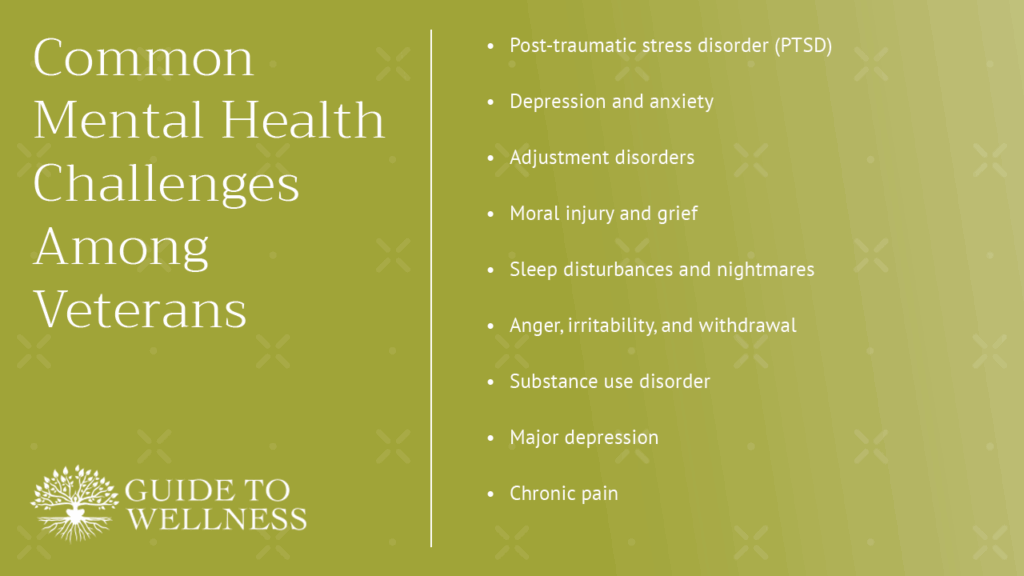When veterans return home, they carry more than memories of service—they carry experiences that have shaped their minds, bodies, and relationships in lasting ways. A family member can play a crucial role in supporting veterans’ mental health and recovery, providing essential social support during challenging transitions. Unfortunately, many veterans feel that their emotional needs are overlooked, minimized, or misunderstood. They’ve served their country with commitment. What they often don’t receive in return is mental health care that truly listens.
At Guide to Wellness, we believe veterans deserve more than generic treatment plans and long waits. We recognize that active military service, even if it lasts only a few years, can have lasting psychological effects on veterans’ mental health. They deserve compassionate, personalized, and flexible care on their terms.
Skip the red tape and talk to a real person who understands your story—our team is here to help you start healing. Reach out today.
The Emotional Toll of Service: PTSD, Depression, and More
Military service often demands a level of mental toughness that civilians may never fully understand. From combat exposure and loss to the stress of reintegration into civilian life, veterans carry invisible wounds that can deeply affect their emotional well-being.
Common mental health challenges among veterans include:
- Post-traumatic stress disorder (PTSD)
- Depression and anxiety
- Adjustment disorders
- Moral injury and grief
- Sleep disturbances and nightmares
- Anger, irritability, and withdrawal
- Substance use disorder
- Major depression
- Chronic pain
These struggles are real—and they’re valid. At Guide to Wellness, we recognize the complex ways military life impacts mental health and approach every client with the dignity and understanding they deserve.
Female veterans and male veterans may experience PTSD and other mental health conditions differently, with female veterans at higher risk for military sexual trauma. Studies show that mental health problems such as suicide and PTSD are more prevalent among veterans compared to the general population and non-veterans.
Combat veterans are at increased risk for posttraumatic stress disorder and other mental health issues due to exposure to traumatic events during service. Risk factors for mental health conditions include combat exposure, military sexual trauma, and substance use. Symptoms such as trouble sleeping, difficulty concentrating, feeling hopeless, and physical problems like headaches or fatigue can be warning signs of underlying mental health issues. Suicide is a leading cause of death among veterans, often linked to PTSD, depression, and substance use.
Barriers to Care: Stigma, Access, and Trust
One of the most common reasons veterans avoid seeking help? They’ve been conditioned to “tough it out.” Stigma around mental health in military culture can make asking for support feel like weakness. Others face logistical barriers like rural location, lack of VA access, or difficulty finding a therapist they can trust.
Primary care providers and other healthcare providers play a key role in screening for mental health concerns, military service history, and connecting veterans to mental health resources. However, some veterans have also had frustrating experiences with impersonal providers—waiting months for appointments, only to feel rushed, misunderstood, or shuffled through a system that doesn’t prioritize their needs. Service members and active duty personnel may face additional barriers to accessing care due to confidentiality concerns and military protocols.
That’s where we do things differently.
Bridging the Gap: Telehealth for Veterans, Informed by Veterans
At Guide to Wellness, our approach to veteran mental health care is rooted in connection, flexibility, and respect. Whether you’re navigating PTSD, dealing with transitions, or simply need someone to talk to, our telehealth services are designed to meet you wherever you are, physically and emotionally. Research shows that telehealth and trauma-informed care can be highly effective for veterans seeking support for PTSD symptoms and other mental health concerns.
Here’s how we support veterans:
- No waitlists and no scripts. Our intake is human, not robotic.
- Flexible telehealth sessions that fit your schedule—even if you’re working full time or managing other responsibilities.
- Clinicians who are trauma-informed and trained in veteran-specific challenges, including moral injury, combat stress, and reintegration.
- Respect for your story. No judgment. No assumptions. Just someone who listens and helps you process on your terms.
We offer a range of treatment options, including evidence-based mental health treatment for PTSD symptoms, depression, and substance use disorders. Clinicians use diagnostic criteria to assess mental health conditions and tailor treatment plans to your unique needs. Veterans can access support resources and resources through Guide to Wellness to find support, manage stress, and connect with additional services.
Whether you’ve tried therapy before or this is your first step, we’re here to make the process easier, not harder.
Real People, Not Protocols
You won’t find red tape and scripts here. You’ll find people.
At Guide to Wellness, we believe that trust is earned through genuine connection, not clinical checklists. From your first call to your ongoing sessions, you’ll work with a care team that sees you as a person, not a diagnosis. We honor your service by offering real, meaningful care in return.
We also recognize that many veterans don’t need a one-size-fits-all solution. Some need short-term support during a tough season. Others want long-term care to unpack years of trauma. Some prefer structured approaches like EMDR or CBT. Others want space to simply be heard. We tailor your care plan to you.
For those seeking care outside the Veterans Affairs system or in collaboration with VA services, Guide to Wellness offers flexible support options. We also provide mental health updates and online resources to keep veterans informed about the latest treatment options and support available.
Using Your Benefits: VA Community Care & TRICARE Pathways
Veterans often don’t realize that they have options beyond the VA. If you qualify for VA Community Care, you can receive therapy outside of the VA system, including with us at Guide to Wellness. We can walk you through the process of getting a referral from your VA provider so you can use your benefits with a trusted clinician.
We also accept TRICARE, which covers mental health services for veterans and their families. If you’re not sure what your benefits cover, our admin team is happy to assist you with navigating insurance, referrals, and access, so you can focus on healing, not paperwork.
If you or someone you know is experiencing a mental health crisis, immediate help is available through the Veterans Crisis Line and other crisis line services, which provide 24/7 support from trained responders. Suicide prevention is a top priority, and these resources are critical for veterans in need of urgent mental health support.
You Served. Now It’s Time to Be Supported.
You shouldn’t have to fight for your mental health care. At Guide to Wellness, we provide telehealth support for veterans that’s easy to access, grounded in real human connection, and tailored to your unique needs. Whether you’re ready to talk or just exploring your options, we’re here for you—no pressure, no judgment.
Because healing doesn’t happen through red tape. It happens through trust.
You served with strength—now let us serve you with care that truly listens and meets you where you are. Contact Guide to Wellness today.






